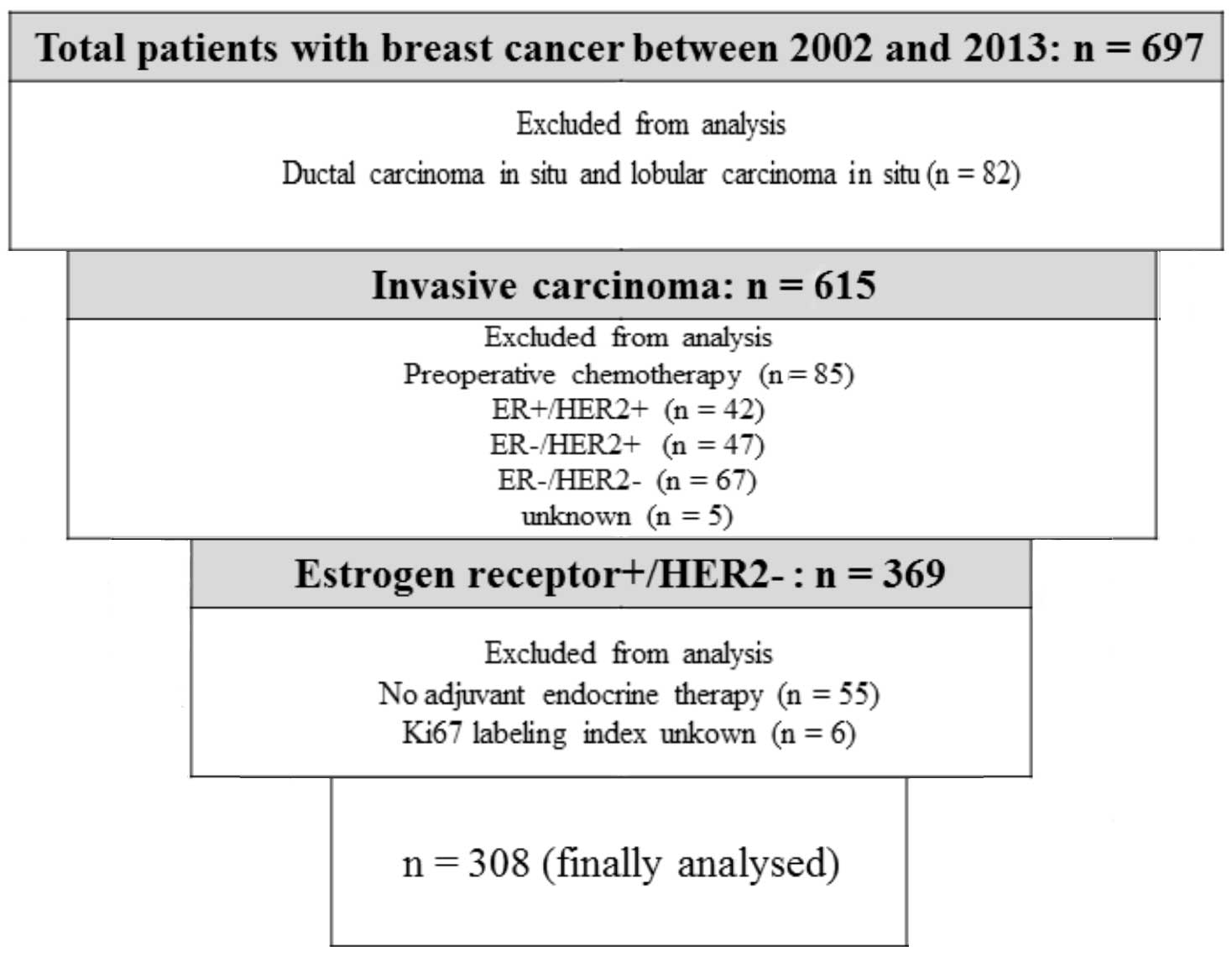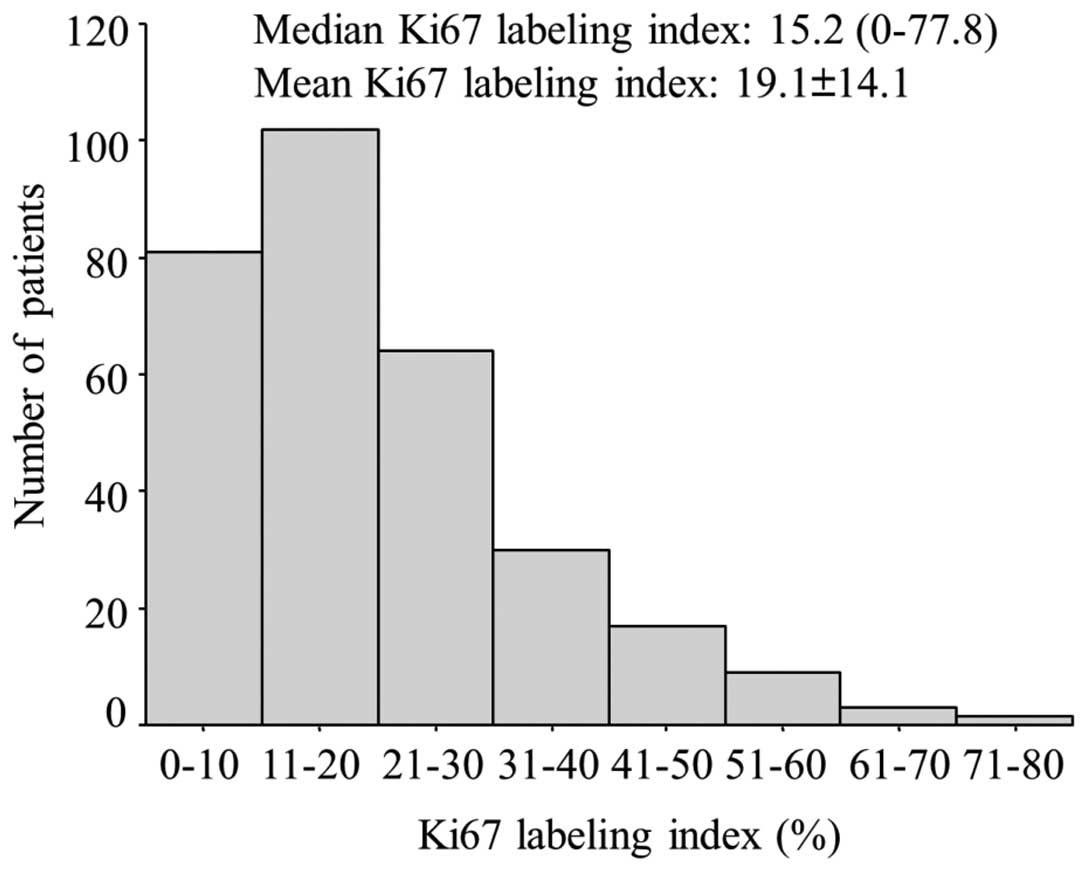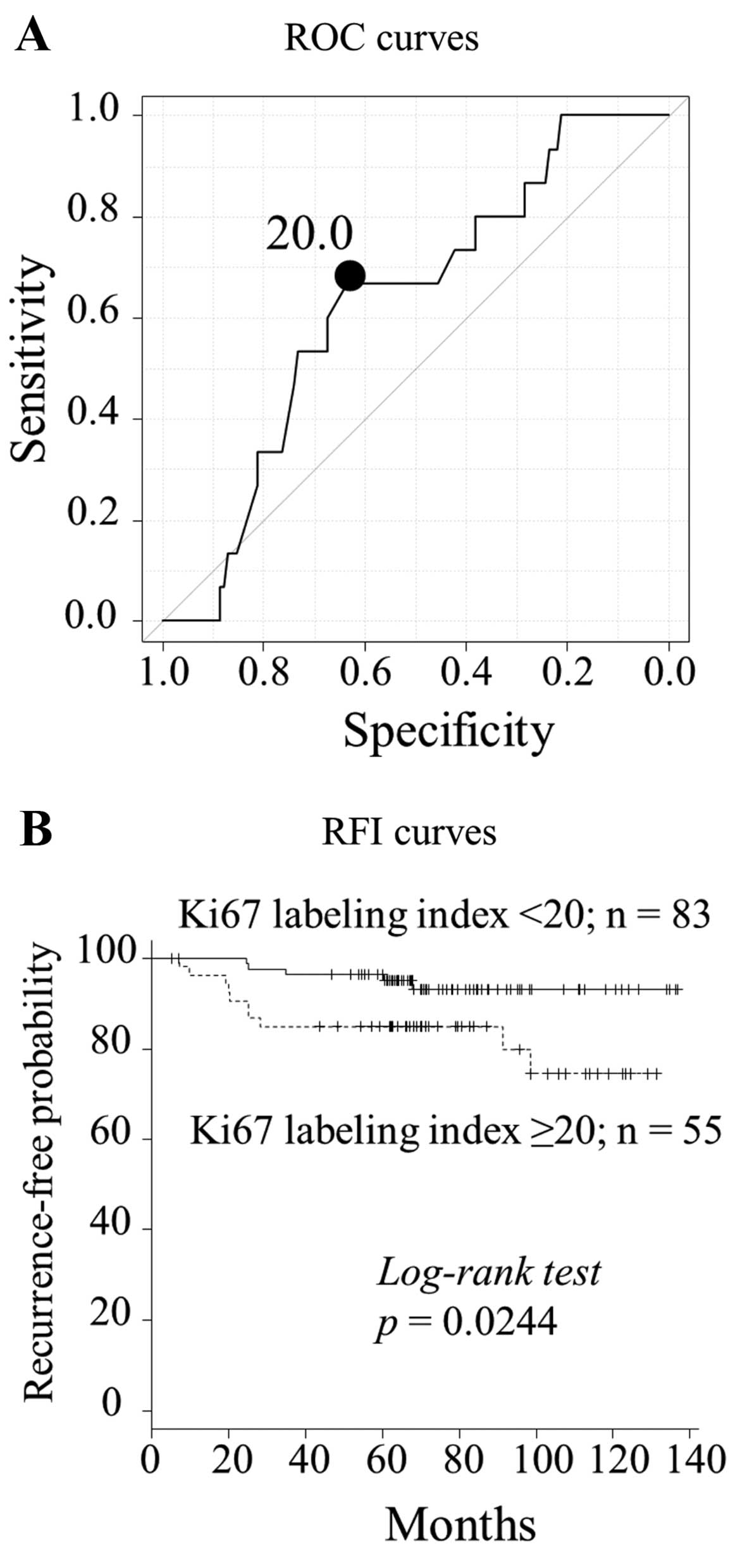|
1
|
Badve S and Nakshatri H:
Oestrogen-receptor-positive breast cancer: Towards bridging
histopathological and molecular classifications. J Clin Pathol.
62:6–12. 2009. View Article : Google Scholar : PubMed/NCBI
|
|
2
|
Hortobagyi GN: Treatment of breast cancer.
N Engl J Med. 339:974–984. 1998. View Article : Google Scholar : PubMed/NCBI
|
|
3
|
Early Breast Cancer Trialists'
Collaborative Group: Tamoxifen for early breast cancer: An overview
of the randomised trials. Early Breast Cancer Trialists'
Collaborative Group. Lancet. 351:1451–1467. 1998. View Article : Google Scholar : PubMed/NCBI
|
|
4
|
Mauri D, Pavlidis N, Polyzos NP and
Ioannidis JP: Survival with aromatase inhibitors and inactivators
versus standard hormonal therapy in advanced breast cancer:
Meta-analysis. J Natl Cancer Inst. 98:1285–1291. 2006. View Article : Google Scholar : PubMed/NCBI
|
|
5
|
Cheang MC, Chia SK, Voduc D, Gao D, Leung
S, Snider J, Watson M, Davies S, Bernard PS, Parker JS, et al: Ki67
index, HER2 status, and prognosis of patients with luminal B breast
cancer. J Natl Cancer Inst. 101:736–750. 2009. View Article : Google Scholar : PubMed/NCBI
|
|
6
|
Azim HA Jr, Michiels S, Zagouri F,
Delaloge S, Filipits M, Namer M, Neven P, Symmans WF, Thompson A,
André F, et al: Utility of prognostic genomic tests in breast
cancer practice: The IMPAKT 2012 Working Group Consensus Statement.
Ann Oncol. 24:647–654. 2013. View Article : Google Scholar : PubMed/NCBI
|
|
7
|
Goldhirsch A, Winer EP, Coates AS, Gelber
RD, Piccart-Gebhart M, Thürlimann B, Senn HJ, Albain KS, Andre F,
Bergh J, et al: Panel members: Personalizing the treatment of women
with early breast cancer: Highlights of the St. Gallen
International Expert Consensus on the Primary Therapy of Early
Breast Cancer 2013. Ann Oncol. 24:2206–2223. 2013. View Article : Google Scholar : PubMed/NCBI
|
|
8
|
Domagala W, Markiewski M, Harezga B,
Dukowicz A and Osborn M: Prognostic significance of tumor cell
proliferation rate as determined by the MIB-1 antibody in breast
carcinoma: Its relationship with vimentin and p53 protein. Clin
Cancer Res. 2:147–154. 1996.PubMed/NCBI
|
|
9
|
Trihia H, Murray S, Price K, Gelber RD,
Golouh R, Goldhirsch A, Coates AS, Collins J, Castiglione-Gertsch M
and Gusterson BA: International Breast Cancer Study Group: Ki-67
expression in breast carcinoma: Its association with grading
systems, clinical parameters, and other prognostic factors - a
surrogate marker? Cancer. 97:1321–1331. 2003. View Article : Google Scholar : PubMed/NCBI
|
|
10
|
de Azambuja E, Cardoso F, de Castro G Jr,
Colozza M, Mano MS, Durbecq V, Sotiriou C, Larsimont D,
Piccart-Gebhart MJ and Paesmans M: Ki-67 as prognostic marker in
early breast cancer: A meta-analysis of published studies involving
12,155 patients. Br J Cancer. 96:1504–1513. 2007. View Article : Google Scholar : PubMed/NCBI
|
|
11
|
Gnant M, Harbeck N and Thomssen C: St.
Gallen 2011: Summary of the Consensus Discussion. Breast Care
(Basel). 6:136–141. 2011. View Article : Google Scholar : PubMed/NCBI
|
|
12
|
Untch M, Gerber B, Möbus V, Schneeweiss A,
Thomssen C, von Minckwitz G, Beckmann MW, Blohmer JU, Costa SD,
Diedrich K, et al: Zurich Consensus: Statement of German Experts on
St. Gallen Conference 2011 on Primary Breast Cancer (Zurich 2011).
Breast Care (Basel). 6:144–152. 2011. View Article : Google Scholar
|
|
13
|
Untch M, Gerber B, Harbeck N, Jackisch C,
Marschner N, Möbus V, von Minckwitz G, Loibl S, Beckmann MW,
Blohmer JU, et al: 13th St. Gallen international breast cancer
conference 2013: Primary therapy of early breast cancer evidence,
controversies, consensus - opinion of a German team of experts
(Zurich 2013). Breast Care (Basel). 8:221–229. 2013.PubMed/NCBI
|
|
14
|
Millar EK, Graham PH, McNeil CM, Browne L,
O'Toole SA, Boulghourjian A, Kearsley JH, Papadatos G, Delaney G,
Fox C, et al: Prediction of outcome of early ER+ breast
cancer is improved using a biomarker panel, which includes Ki-67
and p53. Br J Cancer. 105:272–280. 2011. View Article : Google Scholar : PubMed/NCBI
|
|
15
|
Kobayashi T, Iwaya K, Moriya T, Yamasaki
T, Tsuda H, Yamamoto J and Matsubara O: A simple
immunohistochemical panel comprising 2 conventional markers, Ki67
and p53, is a powerful tool for predicting patient outcome in
luminal-type breast cancer. BMC Clin Pathol. 13:52013. View Article : Google Scholar : PubMed/NCBI
|
|
16
|
Boyle DP, McArt DG, Irwin G,
Wilhelm-Benartzi CS, Lioe TF, Sebastian E, McQuaid S, Hamilton PW,
James JA, Mullan PB, et al: The prognostic significance of the
aberrant extremes of p53 immunophenotypes in breast cancer.
Histopathology. 65:340–352. 2014. View Article : Google Scholar : PubMed/NCBI
|
|
17
|
Yamamoto M, Hosoda M, Nakano K, Jia S,
Hatanaka KC, Takakuwa E, Hatanaka Y, Matsuno Y and Yamashita H: p53
accumulation is a strong predictor of recurrence in estrogen
receptor-positive breast cancer patients treated with aromatase
inhibitors. Cancer Sci. 105:81–88. 2014. View Article : Google Scholar : PubMed/NCBI
|
|
18
|
Cancer Genome Atlas Network: Comprehensive
molecular portraits of human breast tumours. Nature. 490:61–70.
2012. View Article : Google Scholar : PubMed/NCBI
|
|
19
|
Goldhirsch A, Glick JH, Gelber RD, Coates
AS, Thürlimann B and Senn HJ: Panel members: Meeting highlights:
International Expert Consensus on the primary therapy of early
breast cancer 2005. Ann Oncol. 16:1569–1583. 2005. View Article : Google Scholar : PubMed/NCBI
|
|
20
|
Goldhirsch A, Wood WC, Gelber RD, Coates
AS, Thürlimann B and Senn HJ: 10th St. Gallen conference: Progress
and promise: Highlights of the International Expert Consensus on
the primary therapy of early breast cancer 2007. Ann Oncol.
18:1133–1144. 2007. View Article : Google Scholar : PubMed/NCBI
|
|
21
|
Goldhirsch A, Ingle JN, Gelber RD, Coates
AS, Thürlimann B and Senn HJ: Panel members: Thresholds for
therapies: Highlights of the St. Gallen International Expert
Consensus on the primary therapy of early breast cancer 2009. Ann
Oncol. 20:1319–1329. 2009. View Article : Google Scholar : PubMed/NCBI
|
|
22
|
Goldhirsch A, Wood WC, Coates AS, Gelber
RD, Thürlimann B and Senn HJ: Panel members: Strategies for
subtypes - dealing with the diversity of breast cancer: Highlights
of the St. Gallen International Expert Consensus on the Primary
Therapy of Early Breast Cancer 2011. Ann Oncol. 22:1736–1747. 2011.
View Article : Google Scholar : PubMed/NCBI
|
|
23
|
National Comprehensive Cancer Network:
Breast Cancer. http://ww.nccn.org/professionals/physician_gls/f_guidelines.asp
|
|
24
|
The Japanese Breast Cancer Society:
General Rules for Clinical and Pathological Recording of Breast
Cancer (16th). Kanehara Shuppan, Tokyo: 2008.
|
|
25
|
Allred DC, Harvey JM, Berardo M and Clark
GM: Prognostic and predictive factors in breast cancer by
immunohistochemical analysis. Mod Pathol. 11:155–168.
1998.PubMed/NCBI
|
|
26
|
Iwaya K, Tsuda H, Hiraide H, Tamaki K,
Tamakuma S, Fukutomi T, Mukai K and Hirohashi S: Nuclear p53
immunoreaction associated with poor prognosis of breast cancer. Jpn
J Cancer Res. 82:835–840. 1991. View Article : Google Scholar : PubMed/NCBI
|
|
27
|
Kanda Y: Investigation of the freely
available easy-to-use software ‘EZR’ for medical statistics. Bone
Marrow Transplant. 48:452–458. 2013. View Article : Google Scholar : PubMed/NCBI
|
|
28
|
Yerushalmi R, Woods R, Ravdin PM, Hayes MM
and Gelmon KA: Ki67 in breast cancer: Prognostic and predictive
potential. Lancet Oncol. 11:174–183. 2010. View Article : Google Scholar : PubMed/NCBI
|
|
29
|
Criscitiello C, Disalvatore D, De
Laurentiis M, Gelao L, Fumagalli L, Locatelli M, Bagnardi V,
Rotmensz N, Esposito A, Minchella I, et al: High Ki-67 score is
indicative of a greater benefit from adjuvant chemotherapy when
added to endocrine therapy in luminal B HER2 negative and
node-positive breast cancer. Breast. 23:69–75. 2014. View Article : Google Scholar : PubMed/NCBI
|
|
30
|
Dowsett M, Nielsen TO, A'Hern R, Bartlett
J, Coombes RC, Cuzick J, Ellis M, Henry NL, Hugh JC, Lively T, et
al: International Ki-67 in Breast Cancer Working Group: Assessment
of Ki67 in breast cancer: Recommendations from the International
Ki67 in Breast Cancer Working Group. J Natl Cancer Inst.
103:1656–1664. 2011. View Article : Google Scholar : PubMed/NCBI
|
|
31
|
Honma N, Horii R, Iwase T, Saji S, Younes
M, Ito Y and Akiyama F: Ki-67 evaluation at the hottest spot
predicts clinical outcome of patients with hormone
receptor-positive/HER2-negative breast cancer treated with adjuvant
tamoxifen monotherapy. Breast Cancer. 22:71–78. 2015. View Article : Google Scholar : PubMed/NCBI
|
|
32
|
Norberg T, Lennerstrand J, Inganäs M and
Bergh J: Comparison between p53 protein measurements using the
luminometric immunoassay and immunohistochemistry with detection of
p53 gene mutations using cDNA sequencing in human breast tumors.
Int J Cancer. 79:376–383. 1998. View Article : Google Scholar : PubMed/NCBI
|
|
33
|
Done SJ, Arneson CR, Ozçelik H, Redston M
and Andrulis IL: p53 protein accumulation in non-invasive lesions
surrounding p53 mutation positive invasive breast cancers. Breast
Cancer Res Treat. 65:111–118. 2001. View Article : Google Scholar : PubMed/NCBI
|
|
34
|
Lacroix M, Toillon RA and Leclercq G: p53
and breast cancer, an update. Endocr Relat Cancer. 13:293–325.
2006. View Article : Google Scholar : PubMed/NCBI
|
|
35
|
Geisler S, Lønning PE, Aas T, Johnsen H,
Fluge O, Haugen DF, Lillehaug JR, Akslen LA and Børresen-Dale AL:
Influence of TP53 gene alterations and c-erbB-2 expression on the
response to treatment with doxorubicin in locally advanced breast
cancer. Cancer Res. 61:2505–2512. 2001.PubMed/NCBI
|

















